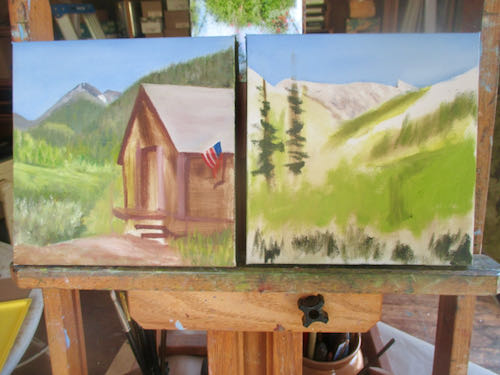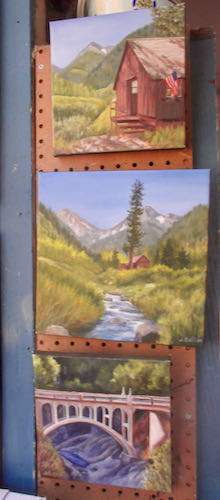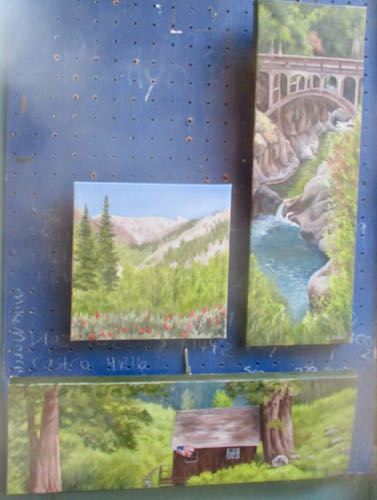Forrest’s Dream Cabin still feels a bit daunting, too hard, too challenging. Maybe I am just lazy. Or the hateful time change still has me dragging. Or too many trips down the hill in one week threw me off my stride.
Excuses, excuses. Even when I am in a diminished state of mental energy and toughness, I can paint Mineral King like nobody’s business*.





When these are dry, I will hook up my old computer to the old scanner and scan them so you can get a better look. Tomorrow I will show you the ones that I photographed because they are too large for the scanner by ONE LOUSY INCH. (Who decided that 17″ was a good dimension for a scanner??)
*Such a strange cliché but I am not interested enough to look it up.
2 Comments
Isn’t it amazing how much more motivated you are when the subject is someone/something/some place you love and know so well?
From one source:
What is the origin of ‘like nobody’s business’? Here is a theory: it comes from the Depression, especially near New York City or the northeastern corridor. The theory is simple: in the Depression, ‘nobody’s business’ was doing well. In a past post, it was noted that the earliest reference was in 1938.
From another source:
The origin of idioms such as “run like nobody’s business” seems to be obscure. Can we compare it with “run like anything”, which I have heard was introduced in the 1600s to avoid swearing (which might attract a fine at that time?)
The origin of many, if not most, idioms is obscure to a degree. In the case of “like nobody’s business,” the OED cites a 1938 use of the phrase by P.G. Wodehouse: “The fount of memory spouting like nobody’s business.” It’s likely that Wodehous was not so much avoiding blasphemy as availing himself of a phrase that had become popular in his day, especially in the milieu which he was trying to re-create. Wodehouse tended to prefer genteel expressions to those that might shock, especially one with a touch of humour or originality, and sometimes a whiff of his favorite milieu. And I imagine that it’s in this time (1920s and ’30s) and in this milieu (carefree upper-class English University types without a lot of responsibility) that the phrase was born.
“Like anything” and the rest of its kind can be attached to any verb, especially of action, to mean “to an extraordinary degree” or “very rapidly.” You’re right to say that “like anything” seems to have been invented to avoid saying “like the devil” or some such.
Both of these essentially meaningless comparisons remain in use, along with comparisons which are only slightly more appropriate, such as “like mad” and “like crazy.”
————————————————
In other words, we haven’t a clue as to how that idiom came to be. Just one of life’s (many) mysteries!
Sharon, I foresee a twilight career for you as a researcher. Thank you!
Comments are closed for this article!